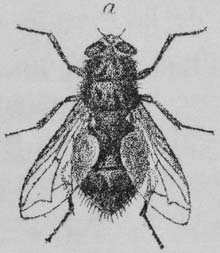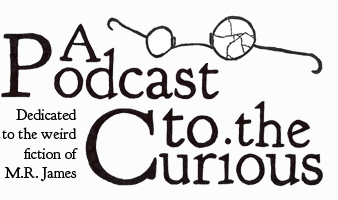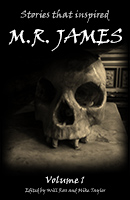 Join Mike and Will as they peer through their scrying glass at the second installment of ‘The Residence at Whitminster’ by M.R. James.
Join Mike and Will as they peer through their scrying glass at the second installment of ‘The Residence at Whitminster’ by M.R. James.
More black magic, strange visions, swarms of satanic flies and is that Beelzebub hiding in the closet? Or is it just R. Kelly? One things for sure, you’ll never look into your underwear draw in the same way again!
Show notes:
- William Oldys (wikipedia)
This English antiquarian and bibliographer provided James with the inspiration for Dr Oldys in ‘Residence at Whitminster’. - Sir Walter Scott – The Talisman (wikipedia)
This is the book which Mary is reading in ‘Residence at Whitminster’ that puts the idea of talismans and scrying into her mind. - Ichneumonoidea Fly aka Sawfly (wikipedia)
Is this the strange species of insect that the inhabitants have such difficulty conclusively identifying? - Anna Seward (wikipedia)
Anna Seward, the ‘Swan of Lichfield’, is the English romantic poet whose prose style James parodies in Mary Oldys’s letter to her friend Emily. - Beelzebub – The Lord of the Flies (wikipedia)
Could the sorcery of Lord Saul have literally summoned up Beelzebub, the devil? In various texts Beelzebub appears in the form of a swarm of flies. - M.R. James – The Fenstanton Witch (Ghosts & Scholars)
Simon McCollough describes M.R. James’s unpublished short stoy ‘The Fenstanton Witch’ as a prototype for ‘Residence at Whitminster’. It also features a pair of young necromancers whose naive sorceries summon up a terrible winged creature, and also namechecks the Witch of Endor. ‘An Evening’s Entertainment’ by M.R. James also features a horrible swarm of flies, which a sexton describes as “Lord of the Flies, sir”. - Salem’s Lot (1979) (youtube)
This is the ‘window’ scene from the 1979 Stephen King adaptation which reminded Will of the ghost of Saul tapping at the villagers windows on cold winters nights. - R.Kelly – Trapped in the Closet (youtube)
The Oldys family are not the only ones with some closet trouble, check out R.Kelly’s magnum opus, his epic 22-part ‘hip-hopera’ “Trapped in the Closet”!
Podcast: Play in new window | Download
Subscribe: RSS
Tags: Anna Seward, beelzebub, Dr Oldys, Episode 16b, insects, Lord of the Flies, M.R. James, Montague Rhodes James, R.Kelly, Residence at Whitminster, Salem's Lot, sawfly, Scrying, Sir Walter Scott, Talisman, Whitminster








I think the “giant insect” in the story is Saul, and I don’t think he’s a giant insect. If “a withered heart makes an ugly thin ghost,” and the apparition of Saul has been slowly wilting away to nothing, then I think the implication here is that the thing that has been mistaken for a giant insect is, in fact, “an ugly thin ghost,” Saul’s withered, shriveled, fading spirit.
Great idea Frank, that didn’t occur to us. I think Saul’s ghost isdescribed as ‘wafting’ at the window which, no you mention it, reminds me of a fly. So the good doctor was maybe misled by the dead flies in the house?
Yes, the thin, rustling thing definitely fits Saul, nearly wasted away. Presumably, he was able to finally get back in because of the talisman then got locked away in the garret with the press. Poor thing. By the time someone finally gets around to letting him back out…he’ll just be a wisp of shadowy smoke watching them from the corner. I guess he must have been what killed the saw-flies, so he wasn’t all bad.
Though I did chuckle at the pink hand coming up out of the linen drawer in the dream, because I’m now sure that Monty had some sort of combined phobia of linen and stuff touching his face. “Dear diary, last night a bed sheet brushed my cheek. *Shudder* The horror. The horror.”
I thought that Saul’s ghost manifested itself by clumping together sawflies until he could guard his possessions but this killed the sawflies.
First of all, congratulations to Mike on your wedding to Kirsty. I wish you two much happiness together!
Thank you very much for another wonderful podcast. You know… when I first read this story, I thought it was creepy, to be sure, but it didn’t terrify me half to death the way “Count Magnus” did. However, I must say that after hearing your overview of it… well, I’m honestly tempted to say I think it’s the scariest episode you’ve ever done.
You really made the most terrible parts – the things coming over the wall, and chasing Lord Saul – stick even more vividly in my mind than they did while reading the story. I don’t think I slept a wink afterwards!
And as usual, you have done so much research, too! It’s always a pleasure to see the things you two have found. Very much looking forward to what you have to say about Mr Poynter. I’ve always thought that story was so funny, but now I’m quite prepared to be terrified!
Oh, before I forget – I’m not sure if this really adds anything at all, but I made a trip to Wales in the spring and they have tales of something called “Cŵn Annwn” there, these huge hounds supposedly of the netherworld, who belong to the god of Death. If you do something evil, they will hunt you down until you die. At least, that’s what our innkeeper told us! Doesn’t it sound a bit like Lord Saul?
The only thing is, though, the Cŵn Annwn are supposed to be white instead of black. It seems like most hell-hounds are black, though. Maybe the Irish equivalent are?
This one puts me in mind of “The White People”, both in the multi-/intra-textual delivery and in the examination of horror v. innocence when it comes to the child practitioner of dark arts. In “The White People”, Machen both condemns and uplifts the central female by having her engage in what he has already defined as great sins but allowing the naivety of the text to present her innocence. Saul, at 16, is a bit old enough to see the evil in his ways, but is also caught off guard when he finds out true cost to pay and despite the laughing at Frank’s demise, might not have really considered the implication.
Then we get Miss Oldys, telling of various glimpses of horror, except mostly describing them in generally placid terms, as she has a vision. Faintly reminiscent of the the green book’s narrator and her stories about learning of the old ways and the white people in the hills.
Except that Machen’s “She poisoned herself–in time” is replaced with a thin, wasting ghost that seems to mostly want to get back inside the light of the house.
I loved your little nod to Charles Dexter Ward there, guys!
I haven’t read this story (nor as much James as I’d like to have read), but that whole description of the feeble daddy long-legs legs, the piles of dead insects and the whole buggy aspect made me quite uncomfortable, I must say. And I was listening to it bed, too!
James really had a knack for creating very relatable, very physical sensations, much more so than Lovecraft, but he was more visual and cosmic (which James called him out for: ‘He uses the word cosmic no more than 24 times’).
It’s feeling the things, like the bug-Saul-demon thing which made my skin crawl!
This story is a bit too all-over-the-place. Saul is possessed… or is he? He summons… something round (the description of the things looking over the wall made me think of the giant spiders in “The Ash-Tree”)… Frank dies, and Saul is hunted by… hell-hounds? Then he comes back as a withered thin thing surrounded by flies?
James really couldn’t decide on a motif for this one, could he?
Isn’t a Bluebeard’s chamber a murder room?
A ‘Bluebeard’s Chamber’ is a locked room that you should not enter lest you get a nasty surprise.
And I think you’re wrong, lads, about what the title means. A ‘residence’ is a building, in this case the house assigned to the prebendary. It’s ‘resident’ that means a person who lives in a particular place.
Well said. I think the title is as read: the name of the building where most of the story takes place.
In the past Sawflies were the topic of theological/philosophical debate:
Charles Darwin himself, it turns out, studied the ichneumon wasp. He mentions it specifically in an 1860 letter to biologist Asa Gray, a proponent of the idea that nature reveals God’s benevolence. Darwin, on the other hand, swayed no doubt by the rather macabre details of this parasitic insect’s life, writes: “I cannot persuade myself that a beneficent and omnipotent God would have designedly created the ichneumonidae with the express intention of their feeding within the living bodies of Caterpillars”—and then, as if to reach the layman, he adds, “Or that a cat should play with mice.” The tabby that curls in your lap and licks your temple, after all, has likely batted a live mouse between its paws until its brain swelled and burst. And the larvae of the giant ichneumon wasp eat, from the inside out and over the course of an entire season, the living bodies of the larvae of a fellow insect.”
Re “residence”, I think the word refers to someone/thing which lives at Whitminster.
A more general point. I love the contrast between the two periods when the place is occupied: the utterly bleak and loveless reign of Thomas Ashton, and the very genial influence of Dr Oldys, under whom everyone seems to like everyone else.
I think the whole “residence” aspect is a playful take on the word–using all definitions in one story.
A persons house–His residence
An official house of a figurehead–The Prebend’s Residence
Description of living in a place–It’s taken up residency in the cupboard
Saul is awful, but he really just acts like a very smart, angry kid whose been neglected. The awful costs of his actions he’s simply too young to appreciate. I got the feeling of a kid who started out the smartest boy in the room but was soon out of his depth.
James mentions his and Frank’s ages and I wondered if this was because Saul had come of age while Frank had not. Saul is spiritually liable for his actions while upon his death Frank is protected.
I don’t think Saul wanted to sacrifice Frank, he wanted to initiate him. He protects him from whatever was coming over the wall and shows him how to scry (and is annoyed by Frank’s reaction). He’s laughing at Dr. Ashton not Frank because the doctor is so willing to swallow his tales whole.
Finally, Dr. Ashton and Dr. Oldys are sort of a study in contrasts. Mrs. Maple’s blithering servant routine was to remind us that Dr. Oldys was a better/nicer/more caring man than Dr. Ashton on a very basic level.
Oh, and I think the things in the cupboard are part of what “he brought with him.”
I agree with Lisa W, Saul was laughing at Ashton. He felt he had outsmarted them all, still showing how callous he was. Frank was dying and he was feeling all smug at his achievement. Just the way a teen would, seeing life very black and white.
I found this story to be overly dark, James really went out of his way. Saul’s fate, Frank’s death, the fact that they were minors is very grim.